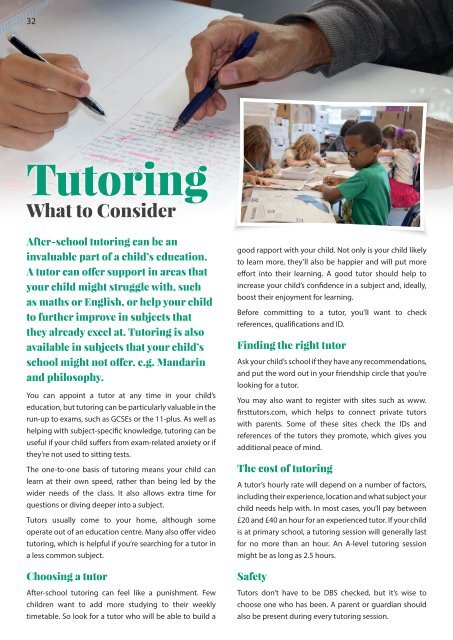Create successful ePaper yourself
Turn your PDF publications into a flip-book with our unique Google optimized e-Paper software.
32<br />
1<br />
Tutoring<br />
What to Consider<br />
After-school tutoring can be an<br />
invaluable part of a child’s education.<br />
A tutor can offer support in areas that<br />
your child might struggle with, such<br />
as maths or English, or help your child<br />
to further improve in subjects that<br />
they already excel at. Tutoring is also<br />
available in subjects that your child’s<br />
school might not offer, e.g. Mandarin<br />
and philosophy.<br />
You can appoint a tutor at any time in your child’s<br />
education, but tutoring can be particularly valuable in the<br />
run-up to exams, such as GCSEs or the 11-plus. As well as<br />
helping with subject-specific knowledge, tutoring can be<br />
useful if your child suffers from exam-related anxiety or if<br />
they’re not used to sitting tests.<br />
The one-to-one basis of tutoring means your child can<br />
learn at their own speed, rather than being led by the<br />
wider needs of the class. It also allows extra time for<br />
questions or diving deeper into a subject.<br />
Tutors usually come to your home, although some<br />
operate out of an education centre. Many also offer video<br />
tutoring, which is helpful if you’re searching for a tutor in<br />
a less common subject.<br />
Choosing a tutor<br />
After-school tutoring can feel like a punishment. Few<br />
children want to add more studying to their weekly<br />
timetable. So look for a tutor who will be able to build a<br />
good rapport with your child. Not only is your child likely<br />
to learn more, they’ll also be happier and will put more<br />
effort into their learning. A good tutor should help to<br />
increase your child’s confidence in a subject and, ideally,<br />
boost their enjoyment for learning.<br />
Before committing to a tutor, you’ll want to check<br />
references, qualifications and ID.<br />
Finding the right tutor<br />
Ask your child’s school if they have any recommendations,<br />
and put the word out in your friendship circle that you’re<br />
looking for a tutor.<br />
You may also want to register with sites such as www.<br />
firsttutors.com, which helps to connect private tutors<br />
with parents. Some of these sites check the IDs and<br />
references of the tutors they promote, which gives you<br />
additional peace of mind.<br />
The cost of tutoring<br />
A tutor’s hourly rate will depend on a number of factors,<br />
including their experience, location and what subject your<br />
child needs help with. In most cases, you’ll pay between<br />
£20 and £40 an hour for an experienced tutor. If your child<br />
is at primary school, a tutoring session will generally last<br />
for no more than an hour. An A-level tutoring session<br />
might be as long as 2.5 hours.<br />
Safety<br />
Tutors don’t have to be DBS checked, but it’s wise to<br />
choose one who has been. A parent or guardian should<br />
also be present during every tutoring session.

















